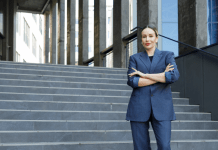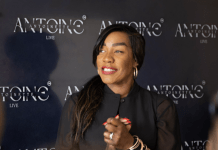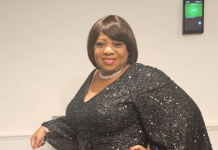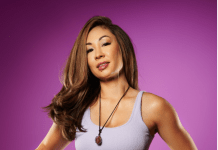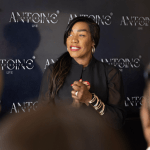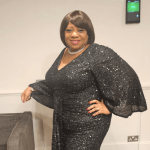From an Indonesian background, Ellen Patricia has always felt that her upbringing promoted the idea of getting a secure job and not following your dreams. Even with having a mother as an entrepreneur, she still went the education route to build her career before finding her passion for counselling. It took eight years working in the corporate world, gaining three degrees, for her to become the coach and counsellor she is today.
Ellen is now a successful, award-winning coach, speaker, counsellor and trainer. Speaking at more than 350 events and producing more than 50 podcasts. She believes education had an impact on her journey and sees the improvement in the system pushing entrepreneurship on students.
“Nowadays the education system in Indonesia has put more emphasis on knowledge and skills related to establishing an enterprise. I think this is related to a fundamental shift in values.”
You had a successful career in the property industry prior to counselling, what led to your resignation from the corporate world? Did you experience burnout?
My main reason is related to growth. I have realised now that growth is one of my life values. I first started working in a property company as a management trainee with a one year contract. Seven months into working, my superior offered me permanent staff with the position of assistant manager. Ever since then, I was promoted every year and was given more & more responsibilities. This is something that never happened before in the company. I was growing & learning so much then, and I felt satisfied with my growth. From an assistant manager, I then became manager, general manager, head of the department, and head of the business unit. Then I was stuck. I felt my growth was impeded, hence I was restless.
Nonetheless, the universe conspired to help me. At that time, I met an old friend who was taking a master’s degree in Counselling. She shared how the programme has helped her grow in her knowledge about herself and others. My interest was piqued. After discussing with my husband, we agreed that taking a master’s degree in Counselling would be a good way to channel my desire for growth. So I took a two-year course whilst still working. It was not easy juggling work, school and family, since my son was still in kindergarten at that time, yet I persisted for one year. During my first year of study, I discovered that I like counselling, and it was a field that had a lot of room to grow in my country. With that consideration, I resigned, focused on my study, and went full time into counselling.
What life experience led to your career in coaching?
 When I was doing counselling, I discovered that quite many clients that came for help actually needed coaching rather than counselling. Being lay people, they did not know the difference between coaching and counselling; they only knew they needed help with their problems. After a couple of years, I decided to get a coaching certification so that I could help my clients properly. It was one of the most significant milestones in my life because it was the beginning of my journey of becoming a professional coach cum counsellor, a rare combination in my country. Even until now, being well equipped in both skills has become one of my unique strengths. When I established my social enterprise a decade ago, I capitalised on this to provide unique offerings, and we are now thriving because of that.
When I was doing counselling, I discovered that quite many clients that came for help actually needed coaching rather than counselling. Being lay people, they did not know the difference between coaching and counselling; they only knew they needed help with their problems. After a couple of years, I decided to get a coaching certification so that I could help my clients properly. It was one of the most significant milestones in my life because it was the beginning of my journey of becoming a professional coach cum counsellor, a rare combination in my country. Even until now, being well equipped in both skills has become one of my unique strengths. When I established my social enterprise a decade ago, I capitalised on this to provide unique offerings, and we are now thriving because of that.
That one experience made me realise that I actually have a wide interest and I do not want to be boxed in a certain profession or field. I want to embrace all of the different parts of me and show up authentically with all of the different facets of me. On top of being a professional coach and a counsellor, I am still serving as the chairwoman of my social enterprise. We currently manage more than 150 volunteers. I have also worked as a coaching consultant, and one of my clients was the World Bank in Indonesia.
I’m also a speaker and trainer that has spoken & facilitated more than 350 learning events and I have produced more than 50 podcasts. I had my own weekly TV talk shows for more than 2 years, and I have written several books, from education to parenting, and children storybooks. I love my colourful and exciting life.
How can coaching change your mindset?
Mindset is a set of beliefs, views, and narratives about the self and the world that is shaped through past experiences. To change a certain mindset, one needs to introduce a new mindset that challenges the old mindset that he/she wants to replace. In the process, one needs to pay attention to the internal conversations that take place in the mind, stop the unsupportive narratives as early as possible, and replace it with more constructive thoughts. This action needs to be repeated over a period of time to strengthen the new mindset and weaken the old one. This is because the brain relies on repetition to form strong new mindsets.
When I coach a client, I use my skills to create a safe place for the client to go deep into their mind and uncover the mindset that he/she needs in order to change for manifest greater success, consistently formulating the next right steps that will help sustain the process of shifting mindset, as well as gently confronting the client when he/she is not taking the action that they intend to do to shift their mindset.
What is the biggest way someone can change their mindset and outlook for the better?
Changing mindsets takes a lot of work over some time. It is definitely not hard; it just needs persistence in putting out effort. Being persistent requires both internal and external resources. One of the most significant internal resources is clarity on why one wants to create a certain mindset, as it will provide the fuel for the process. As for external resources, the ecosystem is one of the biggest. In order to make lasting mindset changes, one will greatly benefit from surrounding oneself with people who have a growth mindset, which promotes continuous effort on transformation, while making space for mistakes and imperfections. Constantly connecting with such people will provide both models, as well as encouragement in the process.
 In your opinion, does education influence entrepreneurship? After gaining your degree did you feel the need to join the corporate world?
In your opinion, does education influence entrepreneurship? After gaining your degree did you feel the need to join the corporate world?
I think education does influence entrepreneurship. When I was studying at university for my bachelor’s degree, the emphasis was on preparing students to be good employees in their respective fields. When my peers and I graduated, all of us were applying for jobs in a plethora of companies. None of us immediately started working on our own business. I only started to establish my enterprise after working for eight years in three organisations. However, I observed that nowadays the education system in Indonesia has put more emphasis on knowledge and skills related to establishing an enterprise. I think this is related to a fundamental shift in values, where at the time of my generation, security in work was highly valued. However, currently, amongst young adults, freedom in work is valued more.
Of course, exposure to entrepreneurial knowledge and skills does not only come from formal education. They can also come from our family contexts and are influenced by the economic and business environment of a country. In my personal experience, having a parent who is an entrepreneur does not guarantee exposure to entrepreneurship. My mother is an entrepreneur, but she hardly ever talked about her business with her children, hence why I hardly gained any knowledge and skills about entrepreneurship from my family. I started to learn about entrepreneurship when I started working. Entrepreneurial knowledge and skills need to be intentionally transferred if we want to have children with budding entrepreneurial inclinations.
How do you manage to have different professions? How do you create a work-life balance?
 Everything starts with belief because we subconsciously structure our lives around our beliefs. In my personal experience, when I hold empowering beliefs, my life feels almost effortless. That’s why I try my best to know more and more about the story I am subconsciously telling myself without looking for proof of its truth. This is so that I can decide later whether I want to keep it or replace it with a more empowering one. One of the empowering beliefs that I have been building is that success can feel effortless, as long as I listen to my inner guidance and keep up my courage to take imperfect actions. That way, I am putting myself more in the inner state of receiving what I want to manifest in life. I don’t need to hurt myself to achieve what I want.
Everything starts with belief because we subconsciously structure our lives around our beliefs. In my personal experience, when I hold empowering beliefs, my life feels almost effortless. That’s why I try my best to know more and more about the story I am subconsciously telling myself without looking for proof of its truth. This is so that I can decide later whether I want to keep it or replace it with a more empowering one. One of the empowering beliefs that I have been building is that success can feel effortless, as long as I listen to my inner guidance and keep up my courage to take imperfect actions. That way, I am putting myself more in the inner state of receiving what I want to manifest in life. I don’t need to hurt myself to achieve what I want.
I have learnt over time that one of the keys to being in the state of receiving is to make use of the power of stillness. I often use breathwork to enter stillness. Paradoxically, being still and “doing nothing” actually helps us to accomplish things. Brene Brown’s explanation may help to better understand this phenomenon. She said that stillness is not about focusing on nothingness; it’s about creating an emotional clearing to allow ourselves to feel, think, dream and question. Stillness brings about clarity. When we are clear about our unique gifts and purpose, as well as what we want to do with them, the universe conspires to help us. As such, balance can hardly be achieved without stillness.

